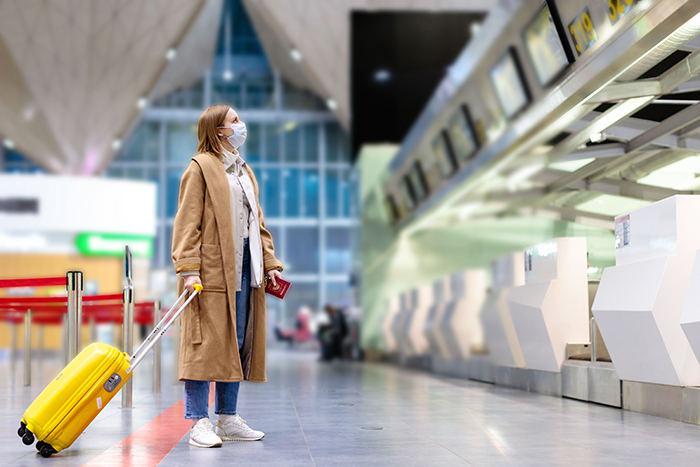
Travelling during a pandemic requires a more detailed and cautious approach than before. Pulmonary and critical care physician Joseph Khabbaza, MD from the Cleveland Clinic in the US, shares his advice on how to approach travel right now.
“As long as we apply our everyday precautions to our travels, the risks can be minimised significantly,” Dr. Khabbaza says. “We can do this by maintaining distance and wearing a mask around those outside of our small circles, keeping our hands sanitized and not touching our eyes, nose, or mouth if our hands are not clean. Being in environments where mask compliance is strong is also important in minimising risk and keeping occurrences of COVID-19 transmission low.”
How to protect yourself from COVID-19 in the car
Considering our vehicles are familiar and comfortable to us, it makes sense to embrace the road warrior approach for vacation, Dr. Khabbaza says. “We tend to take road trips with those in our immediate circles so driving will be the safest route of travel during a pandemic,” he adds.
However, he points out that there are some precautions you should take before you hit the road. Start by cleaning and disinfecting your vehicle thoroughly. Wipe down all high-touch surfaces and parts (windows, seat belts, the steering wheel, door handles, controls, etc.). And be sure to keep antibacterial wipes and hand sanitizer in the car so you can wipe down everything and passengers can clean their hands after each stop.
Before stopping for petrol or food, designate a runner for these travel-related tasks. Make sure your designated runners mask up and clean their hands thoroughly before getting back in the car. And as you are filling up, avoid scrolling through your phone while pumping petrol to minimise the risk of any contamination.
As you are cruising to your destination, keep the windows open, if possible, to let fresh air in and boost ventilation. If air conditioning is a must, set the air ventilation or air conditioning to non-recirculation mode.
How to protect yourself from COVID-19 when you fly
If you decide to take to the skies, keep in mind that staying safe on a plane requires far more than just wearing a mask, Dr Khabbaza says. Before you even get to the plane, you have to contend with check-in terminals and security lines. This means coming in contact with frequently touched surfaces and being around a lot of people. While your concern might be centered on staying safe on the plane, you should focus more on protecting yourself before boarding.
“The wild card with modes of travel like flying is that you have no idea who will be seated next to you,” Dr. Khabbaza explains. “If masking is enforced during the flight, hands are kept clean and you avoid touching your face, the risk to you is low.”
According to the US Centers for Disease Control and Prevention (CDC), most viruses do not spread easily on flights because of how air circulates and is filtered on planes. In an effort to stop the spread of COVID-19, many airlines have taken necessary precautions to keep their planes sanitized and safe for travellers.
Airplanes these days have HEPA filters and clean outdoor air as well as recirculated air passes through them. Many airlines are thoroughly cleaning and even fogging planes with electrostatic disinfectant that clings to seatbelts and other high-touch surfaces. Some airlines have even adjusted seating arrangements to allow for more room between passengers.
As for personal protection, a number of airlines require face coverings to board flights. Some are even providing antibacterial wipes for passengers. You can use sanitizer or wipes to clean armrests, seats, light buttons and even the bathroom door handle for extra peace of mind.
How to protect yourself from COVID-19 at a hotel or rental home
Whether you opt for a hotel or rental home, either can be safe if you are cautious, follow social distancing guidelines, and ask the right questions beforehand, Dr. Khabbaza says.
Before booking, look into the hotel’s or rental property’s cleaning protocol. In an effort to maintain transparency, a lot of places are disclosing how they are going above and beyond to keep guests safe. For instance, hotels are disinfecting more and offering online check-in and digital keys. Many have also implemented 24-hour vacancies for rooms in between guests. On the other hand, vacation rental companies like Airbnb have established new cleaning protocols.
These spaces should be thoroughly cleaned before your stay, but you can always bring cleaning supplies to sanitize surfaces for additional comfort. And similar to modes of transportation, your safety in a hotel room or vacation rental home ultimately comes down to wearing your mask in public spaces, washing your hands regularly, sanitizing high-touch surfaces upon arrival and not travelling if you are sick.
“Despite still being in the midst of a pandemic, most of the things that we were doing before can still be done safely. It really is as simple as keeping our distance from others, keeping our hands clean and covering the parts of our body where respiratory droplets could enter or exit with a mask,” says Dr. Khabbaza.